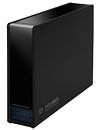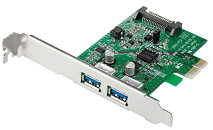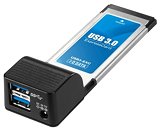- Joined
- Oct 9, 2007
- Messages
- 47,895 (7.38/day)
- Location
- Dublin, Ireland
| System Name | RBMK-1000 |
|---|---|
| Processor | AMD Ryzen 7 5700G |
| Motherboard | Gigabyte B550 AORUS Elite V2 |
| Cooling | DeepCool Gammax L240 V2 |
| Memory | 2x 16GB DDR4-3200 |
| Video Card(s) | Galax RTX 4070 Ti EX |
| Storage | Samsung 990 1TB |
| Display(s) | BenQ 1440p 60 Hz 27-inch |
| Case | Corsair Carbide 100R |
| Audio Device(s) | ASUS SupremeFX S1220A |
| Power Supply | Cooler Master MWE Gold 650W |
| Mouse | ASUS ROG Strix Impact |
| Keyboard | Gamdias Hermes E2 |
| Software | Windows 11 Pro |
I-O Data released a trio of products circled around the new USB 3.0 SuperSpeed standard. The first being the HDJ-UT external hard drive that supports USB 3.0, and then expansion cards that provide USB 3.0 support to PCs, desktops and notebooks alike: the USB3-PEX PCI-Express x1 two port low-profile addon card, and USB3-EXC ExpressCard 34 card. The HDJ-UT comes in capacities of 1 TB and 1.5 TB, and is backwards compatible with USB 2.0 systems. When connected using USB 3.0, it offers read speeds of up to 139 MB/s. The HDJ-UT external HDD is priced at US $231 (1 TB) and $279 (1.5 TB), while the USB3-PEX and USB3-EXC are priced at $69 and $93, respectively.



View at TechPowerUp Main Site



View at TechPowerUp Main Site






